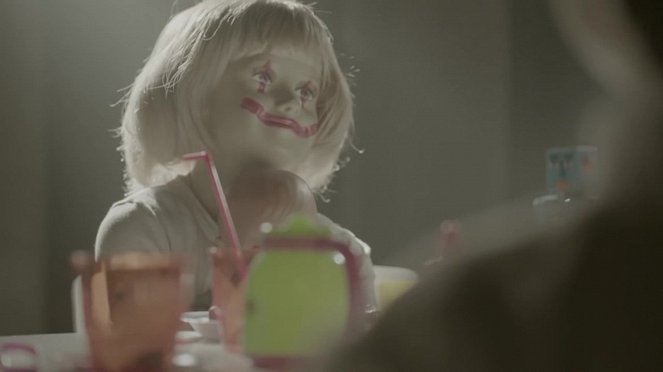Stoffentwicklung:
Hans RosenfeldtBesetzung:
Sofia Helin, Kim Bodnia, Thure Lindhardt, Rafael Pettersson, Sarah Boberg, Dag Malmberg, Puk Scharbau, Lars Simonsen, Gabriel Flores Jair (mehr)Staffel(4) / Folgen(38)
Inhalte(1)
Die berühmte Öresund-Brücke bei Nacht: Ein Stromausfall hat die Verbindung zwischen Dänemark und Schweden in Dunkelheit gehüllt. Kurz darauf wird eine tote Frau mitten auf der Brücke gefunden. Eine tote Frau? Bei näherer Untersuchung ergibt sich, dass die Leiche in der Mitte zusammen genäht wurde, und eigentlich von zwei Frauen stammt: Der Oberkörper gehört der Vorsitzenden des Stadtrates von Malmö, der untere Teil einer dänischen Prostituierten. Da Staatsbürger aus beiden Ländern betroffen sind, ermitteln die schwedische Kommissarin Saga Norén (Sofia Helin) und ihr dänischer Kollege Martin Rohde (Kim Bodnia) gemeinsam. Und dann wendet sich der Mörder an die Öffentlichkeit: Er kündigt weitere spektakuläre Ereignisse an, denn er hat eine Botschaft zu vermitteln ... (Verleiher-Text)
(mehr)Videos (4)
Kritiken (7)
1. Serie: Für Liebhaber der "over-twisted" und sozialbewussten nordischen Detektivgeschichten, mutet dies in etwa wie ein Luxus-Schokoladengeschäft an. Obwohl der Rahmen dieser Serie dem Modell eines amerikanischen Thrillers über thematisches Verbrechen folgt, dieses jedoch natürlicherweise ins nordische Wertesystem einarbeitet und es im Kontext sozialer Phänomene wahrnimmt - der mysteriöse Kriminelle funktioniert dann bis zu einem gewissen Zeitpunkt wie Nolans Joker, d.h. als Inszenator vor Ereignissen, welche die Vorliebe der beschaulichen Gesellschaft für Exzesse darlegen. Einige seiner "Tests" sind brillant und ihre grenzwertige moralisch-ethische Art geht über die Grenzen der üblichen politischen Korrektheit hinaus. Schlussendlich dann die Tatsache, dass Die Brücke - Transit in den Tod immer noch um eine "versöhnlichere" Motivation des Täters bemüht ist, das als eine Art erwartete Steuer anmutet, welche das Vergnügen am Chaos, welches von "TT" begangen wird, nicht beeinträchtigt. Außerdem wird diese Steuer von schwindelerregenden Gewinnen begleitet - ein wunderbar asymmetrisches zentrales Duo mit der fröhlichen Kim Bodnia sowie der außerirdischen Sofia Helin (ihre Saga hat mir endlich erklärt, was für manche Frauen bei Cumberbatchs Sherlock doch so sexy ist), metrosexuelles Lichtdesign und sowie coole, wunderschöne Bilder, die umrahmt werden, schützen Die Brücke - Transit in den Tod davor dem Sentiment- und Genreklischees zu verfallen. Pures Vergnügen am Visuellen und bis zur letzten unwichtigen Aufnahme (selbst in einer Pufferzene, in welcher der Detektiv aus dem Auto steigt und nach Hause geht, hat eine solche Beleuchtung, so dass man sieht, wie jemand hierüber als integralen Bestandteil des Ganzen nachdachte), eine kühle und zurückgezogene Atmosphäre, eine interessante Sonde ins skandinavische Gewissen und trotz der Vorhersehbarkeit gibts´ hier ein stark emotionales Finale ... Sofern Sie bei Namen wie Mankell, Nesbo oder Larsson zumindets ein wenig die Ohren spitzen, und sich manchmal eine BBC-Version des Wallander fetischistisch reinziehen, dann muss dies den Panzer der gefrorenen Landschaft des Herzens gezwungenermaßen durchdringen. 2. Serie: Es gibt hier ein bisschen mehr Eselsbrücken sowie eigentümliche Diskrepanzen, eine wiederum ein wenig zweckgerichtete Arbeit mit Nebenlinien (Charaktere und ihr Schicksal erscheinen lediglich als zielgerichtete "Komplikationen" der Handlung). Andererseits haben die Macher diesmal dazugelernt und die Spannung sowie die "globale" Perspektive des Falles konstant beibehalten. Sofern denn die erste Serie um den 7. Teil herum etwas absackte, so ist das Tempo hier konstant und die Abstufung erfolgt paradoxerweise durch eine Verschiebung auf die intime Ebene der Charaktere. Das Ende ist eines der besten, was es im Genre zu sehen gibt. Es fehlt hier selbst an einem monströsen Cliffhanger der Haupthandlung nicht, jedoch die größte Stärke der Erzählung besteht im Wiederholen des Racheakts vom Ende der ersten Serie. Jens, als "Vermächtnis" der ersten Serie funktioniert die ganze Zeit über großartig, und während die Dialoge und sozialen "Fauxpas" von Saga und Martin der selben Intensität entbehren, treibt das abgemagerte Gespenst des "Terroristen der Wahrheit" ihre Beziehung weiter dem bitteren Finale entgegen. Ich freue mich sehr auf die Fortsetzung, denn die Macher haben die Fähigkeit unter Beweis gestellt, Qualität aufrecht zu erhalten, das Konzept nicht zu ändern und dennoch weiterzumachen. Außerdem unterliegt die Saga im Gegensatz zu Sherlock nicht der Funktionsweise eines "sozialen Superstar". Je mehr sie sich öffnet, desto menschlicher, unvollkommener und auch weniger cool wirkt sie. Eigentlich ist sie in Anbetracht ihrer Hässlichkeit ziemlich nervig und in gewisser Hinsicht beginnt sie, ihre Kollegin Kommissarin Lund zu provozieren.
()
(weniger)
(mehr)
The Bridge is an extremely precise genre spectacle in every respect. But in that lies my sole criticism of it. The screenwriting concept and genre focus are too obvious throughout the narrative with the eccentric duo of investigators, the interconnection of the case with the social issues of the day, the criminal genius and his elaborate plan, and ultimately the premise itself, which makes it clear that this is a Scandinavian co-production. Though in principle it is unfair to compare all Scandinavian crime productions to the ground-breaking The Killing (which of course was far from being the first internationally successful title of its genre; see Unit One, for example). But it is quite evident that The Bridge comes from the same dramaturgical roots and would like to have the same effect. Because of its exceedingly obvious contrivance, it will always remain “just” a genre series and will never be able to measure up to the complexity and emotional and ethical impact of The Killing, especially its climactic third season.
()
Because I like to begin my reviews with flowery journalistic language, I can’t allow myself to characterise The Bridge as a series that will give you a chill. Not only with the coldness of the inhospitable environment, framed with chillingly perfect camerawork, but also the coldness of the interpersonal relationships. Though detailed psychological depictions do not play the lead role in the narrative, it is clear from the beginning that there will be no grand declarations of love or heart-rending embraces, which helps to highlight the fact that the one who is sick is not just the wanted killer, but also the society that produced him. In my opinion, Saga Norén is the most convincingly written and acted character with Asperger’s syndrome that I have seen so far, as she is an embodiment of that emotional impassivity. Thanks to her extraordinary scrupulousness, which sharply contrasts with the greater moral flexibility (and thus greater humanity) of the other characters, the series maintains a sense of detachment and never becomes so serious that it would start to be ridiculous (like Luther). At the same time, however, there is no exaggeration of the protagonist’s affliction or excessive effort to balance her inability to empathise against her brilliance as an investigator. Saga is fully devoted only to her work, from which she allows herself to be distracted only when she needs to satisfy some of her basic physical needs. Besides Saga, I found that the main value added of The Bridge is its attempt to present the killer’s deviant ideas in a more ambivalent package by placing them in a broader social context. At the conclusion of the series, its creators unfortunately turn away from diagnosing so-called advanced western societies toward personal traumas and very shallow motivations, which rather diminishes the plausibility of the plot (or perhaps I am merely underestimating the determination of Scandinavian sociopaths). However, I consider the expansion of the scope of the standard investigation to include what is happening in the globalised world to be a clever screenwriting move, as it leads us to assess smaller conflicts also from a macro-perspective. But the bold “from micro to macro and back” narrative structure also causes some outwardly important characters to serve solely for the purpose of drawing attention to more of the bad things happening in the world today (making of BDSM porn), after which they are removed from the scene. Just as the killer’s real motivation does not organically pervade the whole series and mainly seems to be the result of an attempt at an unexpected twist, the investigation itself develops in an oddly stumbling manner. It comes across as a series of partial revelations that are not closely interconnected, and the investigation actually starts over several times. Rather than it being overwrought, I would thus say that it has an inconsistent combination of individual motifs. The loose narrative is held together especially by the icy visual style, which affords no space for warmer colours, and the contrasting pair of investigators, of whom particularly Saga is a strong enough motivation for me to watch the second season. 80%
()
(weniger)
(mehr)
The essence of Scandi crime series with all the essential trimmings. The pluses include the dark and dismal atmosphere, its focus on the characters, exceptional uncompromising nature and social crossover in the form of a (seemingly) socially aware culprit. The minuses include the character of the unerring murderer and the primary the bane of most Scandi crime series, it’s needlessly over-complicated. And over-complicated in spite of a certain transparency of plot; in this case often several episodes in advance. It doesn’t take away anything from the whole show, but it’s annoying. What in the end makes this more than a mere, darn good genre piece is the central duo, who deserve to be serenaded with odes and it’s hard to decide whether it’s better written or acted, and they alone could make much worse series than The Bridge work excellently. The same applies, word for word, for season two as for season one; both the pluses and the minuses. It’s just that here they follow the rules of a continuation “about more and on a bigger scale". It runs the same course, has the same style, theme and structure, just in the guise of a new case. Especially the backstories are almost one to one in terms of type. Whether or not this is a(n) (dis)advantage depends on what you expect from it. Even so, in the end it is sufficiently unique not to come across like some cowardly sticking to tried and tested formulae. Again and mainly thanks to the characters; and this time it isn’t just the central duo, although they are still peerless (not only) in this genre. | S1: 5/5 | S2: 4/5 |
()
I am writing this review after finishing the first series but at the same time I am also in the middle of the second series already which is no worse and is actually based on the exact same idea. The essence of the story is that there is a corpse on the European’s longest bridge between two countries. And since the corpse was found on the territory of two countries, one eccentric Swedish female detective and one also eccentric male Danish detective are in charge of the investigation. The best part is that they are both weathered by life and they both have their own lives with their own rules, addictions, problems and sufferings. Basically they are just normal people like all of us and it is up to the viewer if he likes them or not. But there is a breaking point during the investigation because there are not only scenes from the investigation but gradually some stories from detectives’ personal lives as well. Sofia Helin and Kim Bodnia are by the way excellent in their roles. You won’t find a couple of detectives who would be more natural and at the same time more distinctive than anybody else from for example any US crime series. The European production is much better in this aspect and it’s great that the Northerners used this to their advantage. With a mysterious Nordic atmosphere, which is underlined by a brilliant camera that focuses on Scandinavian austerity in architecture, this series simply cannot disappoint you.
()


